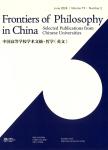Moral Falsity in the Eyes of the Superhuman: The Cases of Socrates and Mozi1
Moral Falsity in the Eyes of the Superhuman: The Cases of Socrates and Mozi1作者机构:Department of Philosophy The University of Hong Kong Hong Kong China
出 版 物:《Frontiers of Philosophy in China》 (中国哲学前沿(英文版))
年 卷 期:2017年第12卷第4期
页 面:515-532页
学科分类:0303[法学-社会学] 03[法学] 0101[哲学-哲学] 0712[理学-科学技术史(分学科,可授理学、工学、农学、医学学位)]
主 题:Plato Socrates Mozi god heaven moral philosophy
摘 要:Both Socrates and Mozi are said in Plato's dialogues and in the Mozi respectively to have claimed that they are living a sort of life following superhuman "intention": Socrates according to the Delphic oracle, and Mozi the intention of heaven. Some modern philosophers show discomfort with their "superstitious" attitudes, taking the claims literally as a kind of groundless devotion, while others conjecture "sensible" purposes to understand the mystic elements as providing moral lessons. This paper, by responding to these modern revisions of their doctrines, aims at highlighting the necessity of their (re-)introductions of superhuman perspectives to their inquiries. Through examining the similarities in Plato's and Mohists' demonstrations, the suggestion made will be that despite countless incommensurable features, heaven's intention for Mohists offers a fundamental philosophical basis which enables them to develop arguments by means of sharp dichotomies, what is right or wrong, in the same way that Socrates in the Apology and in the Hippias Minor does for the development of Plato's constructive endeavour beyond his Socratic a/euporetic legacy. Not only are their practices dependent on the presupposition of the existence of a perspective beyond humans, but also the reality of that perspective is established though their own investigative practices.



